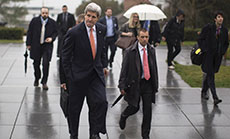
Iranian Nuclear Talks: Spies around the Table

The Guardian
Stakes are high as world leaders meet with a critical deadline looming, and covert surveillance activity is dense - but Lausanne is less of a hotspot than Vienna.

On a few occasions during the recent Iranian nuclear talks in Vienna, the microwave radiation from the surveillance efforts of competing intelligence agencies was so intense that diplomats had to walk some distance from the venue to use their mobile phones.
The density of espionage activity around the marathon negotiations reflects the extremely high stakes for the Middle East and for future global proliferation.
The "allegations" of "Israeli" spying made by senior US officials to the Wall Street Journal came as little surprise to intelligence analysts and officials involved in the talks. It is more noteworthy that the Obama administration chose to go public with the story.
In Lausanne, Switzerland, where the talks are due to resume on Wednesday before a critical deadline at the end of March, British and French officials wandered off into the gardens of the venue, the Beau-Rivage Palace hotel, to call their capitals rather than try to speak from their rooms. But Lausanne is generally seen as being under lighter surveillance than venues in Geneva and Vienna, where there are long-established spy networks from several countries.
The US secretary of state, John Kerry, went for a walk around the Geneva streets with his Iranian counterpart, Mohammad Javad Zarif, in January. It was widely seen as a publicity stunt at the time but it could also have provided an opportunity for a private talk out of range of bugging devices.
Last November, when Kerry wanted to talk to the Canadian foreign minister during a round of talks in Vienna, he did so from a park near the talk's hotel. The Austrian capital, where the Iran nuclear talks were held for much of last year, is a particular espionage hub because of the presence of the International Atomic Energy Agency.
In February 2000, the CIA sent a Russian nuclear engineer on its payroll to Vienna with a blueprint for a nuclear warhead and instructions to deliver it to the Iranian permanent mission. Operation Merlin, described in James Risen's book State of War, was supposed to lead Iranian nuclear scientists along the wrong path.
The blueprints contained a critical flaw that would make any bomb based on them fizzle rather than detonate. The plot itself was compromised from the start, however, as the Russian attached a note to the blueprint warning the Iranians of the deliberate mistake.
A 2012 report by the federal research division of the US library of Congress, described Vienna as being full of agents from the Iranian ministry of intelligence and security.
"It is because of the continuous good relationship between Iran and Austria since the revolution - after the US hostage crisis, which resulted in condemnation of the Islamic republic by many countries and secluded Iran in many ways, Austria was one of the few countries that was not concerned," the report said. "It appears that Iran takes advantage of this relationship by deploying its intelligence officers in Austria."
Vienna is also a primary focus for the Mossad, especially when foreign officials come to town for IAEA board meetings. The book Spies against Armageddon recounts how "Israeli" spies broke into the flat of the head of the Syrian Atomic Energy commission, Ibrahim Othman, in March 2007, and stole details from his laptop of a nuclear reactor under construction at al-Kibar. The site was bombed six months later.
Yossi Melman, one of the book's authors, said: "IAEA board meetings and the Iran talks are a launching pad for various espionage operations because you can recruit people where you have a concentration of delegations, especially from countries where officials are under heavy monitoring at home. You can recruit and debrief agents and bug and break in to hotel rooms. The Americans, British, French, "Israeli", Iranians are all there. Everyone is doing it all the time."
Comments



